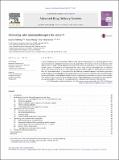| dc.contributor.author | Milling, Lauren Elizabeth | |
| dc.contributor.author | Irvine, Darrell J | |
| dc.contributor.author | Zhang, Yuan, Ph. D. Massachusetts Institute of Technology | |
| dc.date.accessioned | 2018-09-13T19:56:40Z | |
| dc.date.available | 2018-09-13T19:56:40Z | |
| dc.date.issued | 2017-05 | |
| dc.date.submitted | 2017-02 | |
| dc.identifier.issn | 0169-409X | |
| dc.identifier.uri | http://hdl.handle.net/1721.1/117754 | |
| dc.description.abstract | Cancer immunotherapy is now a powerful clinical reality, with a steady progression of new drug approvals and a massive pipeline of additional treatments in clinical and preclinical development. However, modulation of the immune system can be a double-edged sword: Drugs that activate immune effectors are prone to serious non-specific systemic inflammation and autoimmune side effects. Drug delivery technologies have an important role to play in harnessing the power of immune therapeutics while avoiding on-target/off-tumor toxicities. Here we review mechanisms of toxicity for clinically-relevant immunotherapeutics, and discuss approaches based in drug delivery technology to enhance the safety and potency of these treatments. These include strategies to merge drug delivery with adoptive cellular therapies, targeting immunotherapies to tumors or select immune cells, and localizing therapeutics intratumorally. Rational design employing lessons learned from the drug delivery and nanomedicine fields has the potential to facilitate immunotherapy reaching its full potential. | en_US |
| dc.description.sponsorship | National Institutes of Health (U.S.) (Grant CA206218) | en_US |
| dc.description.sponsorship | National Institutes of Health (U.S.) (Grant CA172164) | en_US |
| dc.description.sponsorship | National Institutes of Health (U.S.) (Grant CA174795) | en_US |
| dc.publisher | Elsevier BV | en_US |
| dc.relation.isversionof | http://dx.doi.org/10.1016/J.ADDR.2017.05.011 | en_US |
| dc.rights | Creative Commons Attribution-NonCommercial-NoDerivs License | en_US |
| dc.rights.uri | http://creativecommons.org/licenses/by-nc-nd/4.0/ | en_US |
| dc.source | Elsevier | en_US |
| dc.title | Delivering safer immunotherapies for cancer | en_US |
| dc.type | Article | en_US |
| dc.identifier.citation | Milling, Lauren et al “Delivering Safer Immunotherapies for Cancer.” Advanced Drug Delivery Reviews 114 (May 2017): 79–101 © 2017 The Authors | en_US |
| dc.contributor.department | Massachusetts Institute of Technology. Department of Biological Engineering | en_US |
| dc.contributor.department | Massachusetts Institute of Technology. Department of Materials Science and Engineering | en_US |
| dc.contributor.department | Koch Institute for Integrative Cancer Research at MIT | en_US |
| dc.contributor.mitauthor | Milling, Lauren Elizabeth | |
| dc.contributor.mitauthor | Irvine, Darrell J | |
| dc.relation.journal | Advanced Drug Delivery Reviews | en_US |
| dc.eprint.version | Final published version | en_US |
| dc.type.uri | http://purl.org/eprint/type/JournalArticle | en_US |
| eprint.status | http://purl.org/eprint/status/PeerReviewed | en_US |
| dc.date.updated | 2018-09-06T18:30:52Z | |
| dspace.orderedauthors | Milling, Lauren; Zhang, Yuan; Irvine, Darrell J. | en_US |
| dspace.embargo.terms | N | en_US |
| dc.identifier.orcid | https://orcid.org/0000-0002-1053-0887 | |
| mit.license | PUBLISHER_CC | en_US |
